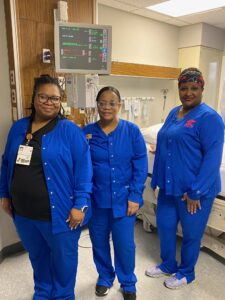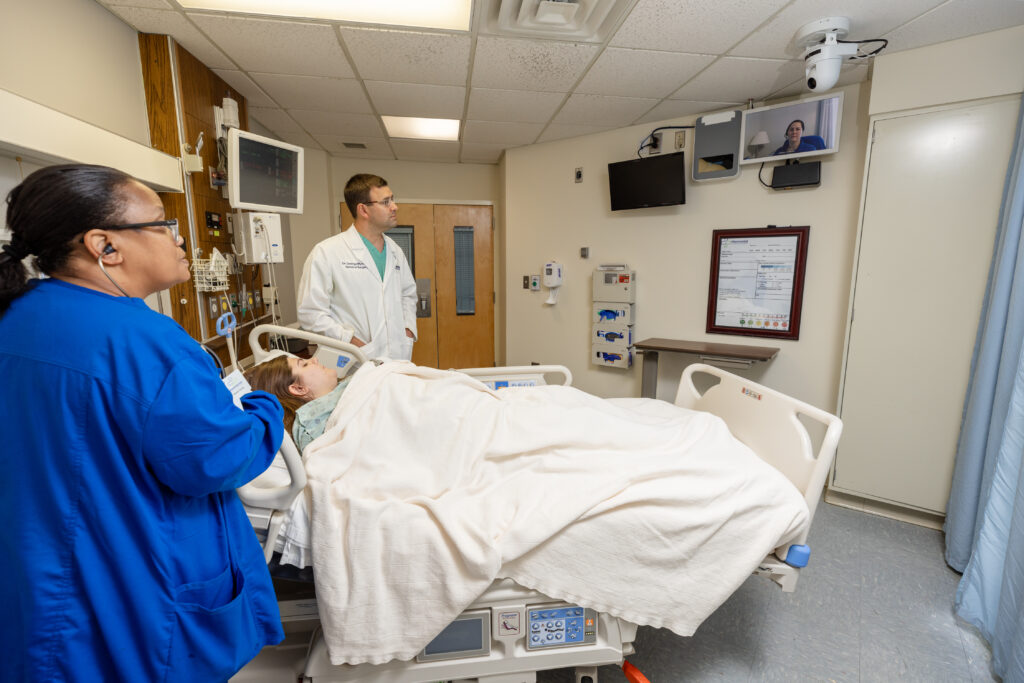
Intensive Care Unit
Memorial Hospital and Manor has one of the most modern and efficient Intensive Care Units in this area. We realize that it is a stressful and emotional time when your loved one is a patient in the ICU. Our nursing staff strives to make patients and their families feel comfortable and secure. Since patients in ICU require constant attention and monitoring in a controlled environment, the ICU has stricter policies on visitation than other areas of the hospital.
Several inpatient and outpatient diagnostic services are offered in Memorial Hospital and Manor’s Intensive Care Unit. These include Resting Echocardiograms, Stress Echocardiograms, Dobutamine Stress Echo, and Holter cardiac monitoring, including both 24-hour and 30-day event tests. Nurses in the ICU also monitor patients in other units of the hospital through telemetry. The Echocardiography Lab services are provided Monday through Friday and are scheduled through our Scheduling Department at (229) 243-6299.
 EICU Center of Care
EICU Center of Care
Acknowledging the stress and emotional strain experienced during such times, our Intensive Care Unit (ICU) nursing staff have always endeavored to create a supportive and secure environment for patients and their families. Now, thanks to the evolution of technology, we have a new tool to assist in providing the best care possible for our intensive care patients: a state-of-the-art Electronic Intensive Care Unit (eICU) program. This cutting-edge initiative marks a significant milestone in our mission to deliver top-tier critical care to our community.
WHAT IS ELECTRONIC INTENSIVE CARE UNIT (EICU)?
An Electronic Intensive Care Unit is a model of telemedicine where state-of-the-art technology is used to provide an additional layer of critical care service to patients. With an eICU program, patients do not have to be in the same hospital as their critical care physicians. Through an eICU platform, caregivers can remotely access patient data, clinical profiles and treatment information. Instead of physical monitoring, a patient’s conditions and vital signs are monitored virtually via high-definition audio and visual equipment, and software tools. The model allows intensive care medicine specialists, or intensivists, and ICU nurses to orally communicate with the ICU, provide real-time support and manage ICU patients remotely. And with eICU, more patients across multiple ICUs and hospitals can access quality care.
THE EICU PROGRAM AT MEMORIAL HOSPITAL AND MANOR
Memorial Hospital and Manor currently has six medical/surgical ICU beds that are being monitored remotely by Emory’s eICU Center, headquartered at Emory Saint Joseph’s Hospital campus in Atlanta. Employing advanced telemedicine technology, this service functions as an additional layer of critical care, extending consultation and expertise to enhance patient outcomes. This innovative system of remote monitoring and expert consultation provided by Emory’s eICU not only augments the critical care offered to patients at Memorial Hospital and Manor but also represents a vital form of telemedicine that ensures continuous, high-quality care for ICU patients, regardless of the time of day or night. Recognizing the importance of this service, the Georgia Department of Community Health allocated a $450,000 grant to bolster this initiative, aiding in the procurement of necessary equipment and the establishment of the eICU services linkage between Memorial Hospital and Manor and Emory. “We are excited to be collaborating with Emory Healthcare for their remote ICU monitoring service funded by a grant through the Department of Community Health,” says Jim Lambert, CEO of Memorial Hospital and Manor. “We feel this service will complement the great care our team provides every day and will allow us to keep more critical patients close to home and family.”
THE RESULTS
The integration of eICU services at Memorial Hospital and Manor has not only revolutionized critical care but has significantly enhanced our capacity to serve the community with exceptional healthcare standards. This innovative initiative was designed to equip our medical staff with cutting-edge tools while ensuring patients receive exceptional care in familiar surroundings. The eICU program was crafted with multifaceted goals: improving care quality, increasing the ability of the ICU to accept more admissions while also transferring fewer patient to other hospitals, enhancing patient and family satisfaction, and ensuring cost-effective care. The technology led to swift adaptations to patient needs, reduced the number of patients being transferred to other hospitals, and notably increased emergency department admissions, thus benefiting the community by providing critical care services locally. While direct cost measures are ongoing, indirect savings via reduced travel expenses and heightened patient satisfaction have already shown significant success. Patients and families have expressed increased confidence in our exceptional care for
critical patients, citing the kindness of our ICU nurses, solidifying trust in our facility. Moreover, the eICU technology has not only improved patient care but has also created a positive work environment, aiding in staff retention and recruitment. This has significantly reinforced our commitment to exceptional care delivery within the community. The collaboration with Emory’s eICU team, including certified ICU intensivists and nurses, has been invaluable. Their continuous monitoring and immediate support during off-hours have ensured state-of-the-art care and guidance, especially benefiting new nurses managing critical patients. “Memorial Hospital and Manor has been working with Emory for almost a year now and we have learned some valuable information,” reflects Hiddleson. “Their staff is 100% dedicated to providing the highest quality care. They are also good partners to work with and are quick to respond to patient issues and needs. Our goal is to support the staff so the patients they care for can remain in their community instead of being transferred to another distant hospital.” Cheryl Hiddleson, MSN, RN, Emory Healthcare Director of eICU Operations. As Memorial Hospital and Manor continues to grow this partnership with Emory Healthcare, the future of critical care in our community appears brighter than ever. With continued collaboration, we are confident that our ability to provide top-tier critical care services will only improve, allowing us to keep critical patients close to their families
ICU Visitation Policy
We believe that maintaining family bonds with ICU patients can provide substantial emotional support for patients, which will aid their recovery. Our visitation policy allows immediate family only to visit ICU patients from 9:00 a.m. to 9:00 p.m. No more than two visitors at a time are allowed and all visitors must be at least 12 years of age. An intercom is located next to the entrance of the ICU waiting room to communicate with ICU nurses. Please check with a nurse before entering a patient’s room to make sure it is an appropriate time to visit.
Visitor waiting areas are located on each end of the ICU, with a corridor connecting the two areas. Children under age 12 are not permitted in the ICU waiting areas. Telephones are located in each waiting room for family use. The extensions for incoming calls are 490 for the east waiting room and 387 for the west waiting room. Visitors may call the ICU nurses station at Extension 146 or 243-6146 to communicate with a nurse.
Please follow these guidelines when visiting ICU patients:
- Rest is important for ICU patients. When visiting, please sit quietly in the room and allow the patient to rest quietly. Please comply with our staff when they request you to leave the unit for brief periods.
- Visitors are asked to leave the waiting area by 9:00 p.m. If necessary, one family member for each patient may remain in the waiting area during the night.
- Families are not allowed to bring special foods to patients unless permitted by the attending physician since ICU patients are often placed on strict diets.
- Flowers are not permitted in ICU patient rooms.
- Patient’s personal items, including jewelry, money and other valuables should not be brought to the hospital. Patients may bring their own personal care items including toothbrush, toothpaste, hair and skin care items, and slippers.
- Information regarding a patient’s care will be relayed to family members by the physician.
